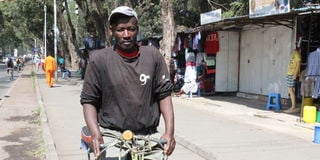Premium
City where bicycle boda boda is still king

Mr Zacharia Mutua, a bicycle bodaboda rider in Nakuru County.The popular cyclists compete for road space with motorists, cars and pedestrians and their ability to pass slow-moving vehicles enable them to operate efficiently and competitively.
What you need to know:
- The taxis serving a niche market are a common sight in the bustling city, wheel-to-wheel with motorcycles and taxi-hailing firms
- Bicycles are cheaper and safer to move about on compared with motorcycles which are expensive and prone to accidents say residents
Every morning, Kevin Kiplagat, a resident of Flamingo in Nakuru County pays Ksh30 to board a bicycle boda boda from his home to his place of work within the Nakuru Central Business District.
Mr Kiplagat, a mitumba trader, says that for the past two years, he has preferred using bicycle bodas even though he could shorten the commute by boarding a motorcycle, tuk-tuk or matatu.
According to the 35-year-old, bicycles are cheaper and safer to move about on compared with motorcycles which are expensive and prone to accidents going by the many careless rider-operators, leading to loss of lives.
“Although the bicycle is a bit slow, I’m assured of making it to my destination safely. I only part with as little as Ksh30 to town, but in the evening return journey, I normally take a leisurely walk back home since it is not that far anyway,” he says.
In Nakuru, which was elevated to city status two years ago, commercial bicycle taxis serve an identifiable niche market and their users argue their absence would leave service gaps.
Efficient and competitive
The two-wheelers are a common sight in the busy town with many owners still clinging onto the business in the face of modern technology in motorcycles and taxi-hailing firms, which have eased transport and movement.
The cyclists compete for road space with motorists and pedestrians and their ability to pass slow-moving vehicles stuck in traffic enables them to operate efficiently and competitively.
The cyclists are mainly young people who find the business attractive because of the relatively low capital investment.
Benson Otieno, 40, has been a cyclist at his stage on club road for close to five years.
He says he is always at work by 8am.
Otieno revealed he turned to the bicycle boda boda after he was sacked from a company he worked for after relocating from his Nyanza home.
He purchased a new bicycle using his savings at Ksh9,000 to sustain his family, a decision he has not regretted since venturing into the business in 2019.
Clean transport alternative
Mr Otieno, a resident of Kaloleni estate in Nakuru East Sub County, said that despite motorcycles being in demand and faster compared to bicycles, many clients prefer bicycles because of their safety record and affordability.
For him, it is a source of livelihood for people who do not have the resources to buy motorcycles.
He says the bicycle is also a clean non-motorised transport alternative compared to motorbikes and cars, which release harmful gases into the environment.
“When our county got city status, we thought we would be sent away. But we have been embraced by almost everyone and a lot has been done to guarantee our rights as road users. We were given guidelines by the county government to adhere to like not dropping passengers along the main Kenyatta Avenue,” he says.
He earns about Ksh400 a day ferrying passengers and on a good day, he can make up to Ksh700, especially weekends.
“I have been able to educate my children through this work. We cannot all fit into the motorcycle business. I work 8am-8pm, and in consideration for my safety, I do not ferry passengers to destinations like Rhonda and Kaptembwa past 6pm,” he says.
Another cyclist, Zachariah Mutua, has also been in the industry for three years.
He ventured into the boda boda business after thieves broke into his shop, he sought an alternative to sustain his family.
Mutua’s friend lent him a bicycle at a fee of Ksh100 per day, until one year down the line, he bought his own.
For the past three years, Mutua has ferried passengers at his stage near Taidys Hotel where he parks alongside 12 other riders. From this hustle, he is able to fend for his family and pay school fees for his three children.
“Competition is high amongst us, but everyone has his own customers. Our relationship with motorbike riders is also good and respectful,” he says.
Nakuru is now home to cyclists running errands and ferrying passengers and parcels, making a living from the long-forgotten bicycle boda bodas that were for years associated with counties in Western Kenya.
On November 30, 2021 former President Uhuru Kenyatta awarded a city charter to Nakuru, making it the fourth city in the country joining Kisumu, Mombasa and Nairobi.





